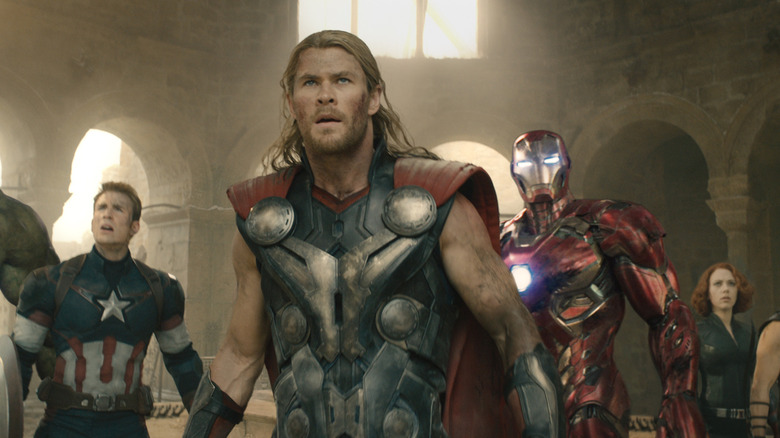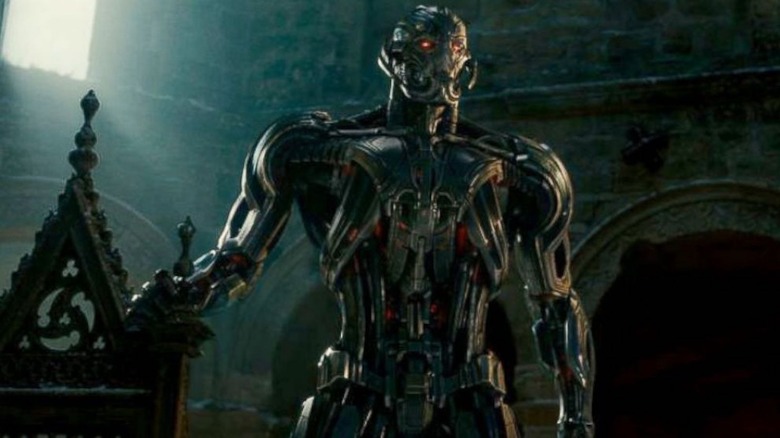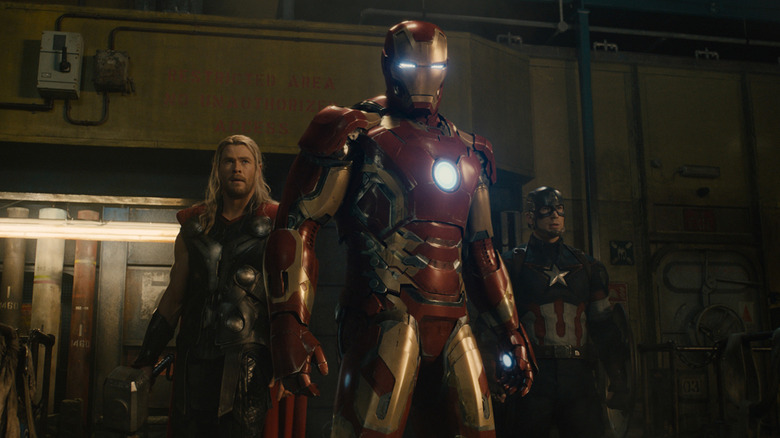Joss Whedon Predicted Marvel's Current Problems While Making Avengers: Age Of Ultron
Regardless of how you feel about the movies, the Marvel Cinematic Universe's 2008 — 2019 run is one of the most impressive achievements in commercial filmmaking history. Starting with Jon Favreau's "Iron Man," Marvel turned several of the company's B-level superheroes into A-level film franchises. Getting non-geeks amped up for the assemblage of "The Avengers" was miraculous enough; playing the long game, and cramming every member of the expanded MCU roster into a largely satisfying two-part blockbuster event via "Avengers: Infinity War" and "Avengers: Endgame" was unprecedented in terms of expense and narrative scale.
What's most amazing to me is that, after the runaway success of "Iron Man," every single one of these movies was a preordained box-office smash. Even "Guardians of the Galaxy," the members of which were completely unknown to the vast majority of the moviegoing public, made bank. Entertainment journalists tried to portray some of these films as risks, but it was abundantly clear that people had bought into the overarching Thanos saga, and would show up to every MCU release to see how each movie would advance the narrative (which, often, wasn't much at all).
For MCU honcho Kevin Feige, this situation was a godsend. For directors who wanted their films to work as standalone experiences, it wasn't always ideal. Joss Whedon felt this way while piecing together 2015's "Avengers: Age of Ultron," and his ambivalence presaged the MCU's present predicament.
The perils of making an episode instead of a movie
"Avengers: Age of Ultron" is no one's favorite MCU movie. It's all set-up. There are a few rousing moments down the stretch, and the first-act party scene where everyone gets drunk and tries to hoist Mjolnir is the kind of endearing hangout moment you wish these films could accommodate more often, but, overall, it's just treading water. Thematically, I think it's one of the juicier installments in the Thanos run, but there's just too much narrative track being laid to get invested in Ultron's arc.
Writer/director Joss Whedon saw this murkiness happening, and, in an interview with Buzzfeed, he discussed how he fought against it:
"No matter how much they may talk about, 'Well, this is going to lead to some terrible stuff down the line,' in my movie, it's designed to be a complete experience. And if I don't do that, if I haven't brought you on that journey and closed it out, f*** me. That's the danger of this sort of serialized storytelling, turning the motion picture experience into episodic TV. Because we have episodic TV, and now you don't even have to wait to watch it, you can binge it. So that's to me a dreadful mistake."
Alas, his worst would eventually be confirmed.
Stuck on a storytelling road to nowhere
According to Whedon, "Somebody said, 'Well, that was a great setup for the next thing!' in one of the test screenings, and I died inside. [Marvel executives] were like, 'No! They say that all the time, it's fine.' I was like, 'No, that's the worst thing I could have heard.' I want people to come out feeling done."
Having grown up reading comic books, I was fine with Feige treating these films as jumbo issues. But I totally get Whedon being aghast at having made a 141-minute prologue to the next phase of MCU movies — especially because I read his pre-shooting draft of "Age of Ultron" and felt it had the potential to be the most satisfying superhero movie ever made. Unfortunately, he had to rejigger certain plot elements so his film wouldn't lock the company into certain story decisions. In keeping all of these plates spinning, he had to dump an amazing Iron Man/Hulk gag that, in terms of audience reaction, would've destroyed the "Puny God" bit from "The Avengers."
It's been four years since the conclusion of the Thanos saga, and Marvel seems stuck in second gear. The Disney+ series have been wheel-spinning exercises, and, until "Ant-Man and the Wasp: Quantumania," the films have been strangely hesitant to plunge into the Kang story. It feels like they're setting up the setup, and, judging from the box office, moviegoers have tired of these go-nowhere episodes. And that's all they are: Episodes in search of a compelling narrative that doesn't yet exist.


